| Srl | Item |
| 1 |
ID:
093563
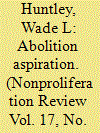

|
|
|
|
|
| Publication |
2010.
|
| Summary/Abstract |
The goal of abolishing all nuclear weapons has often seemed unrealistic, if not utopian. The Cold War posed intractable apocalyptic dangers, and the post-Cold War "peace dividend" proved scant. But over the decades, nuclear arms control and nonproliferation successes have been as important as the setbacks, and in 2010 the abolition aspiration has made something of a comeback. This article surveys the most important challenges facing nuclear disarmament progress today. The article considers the interrelationships among the positions of the key categories of states shaping the contemporary global nuclear order, for good or ill, as a capstone to the other pieces in this special section, which focus on those categories individually. The article concludes that progress toward disarmament will not be easy or fast. Weaning states off their reliance on threats to either use or acquire nuclear arms requires progress in improving the conditions of global governance more generally. But the goal of eliminating the threat of nuclear weapons is a realistic prospect and, consequently, an essential imperative.
|
|
|
|
|
|
|
|
|
|
|
|
|
|
|
|
| 2 |
ID:
094149
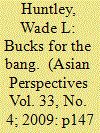

|
|
|
| 3 |
ID:
058021
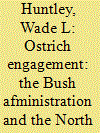

|
|
|
| 4 |
ID:
094098


|
|
|
|
|
| Publication |
2010.
|
| Summary/Abstract |
This article explores the use of scenario analysis as a methodology to rigorously analyze potential space futures, particularly with respect to space security challenges, in the context of rapid and uncertain change across several dimensions of human space activities. The successful use of scenario analysis in other (e.g. corporate and military) sectors is described and results of an initial scenario analysis workshop are presented. Scenario analysis is recommended as a promising approach to evaluating the long-term consequences of various policy choices in the context of uncertainty, and as a process well-suited to fostering communication and building consensual knowledge among diverse stakeholders.
|
|
|
|
|
|
|
|
|
|
|
|
|
|
|
|
| 5 |
ID:
072175
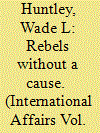

|
|
|
| 6 |
ID:
079660
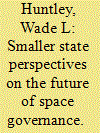

|
|
|
|
|
| Publication |
2007.
|
| Summary/Abstract |
Current debates over impending developments in military and civilian uses of space raise deeper questions of how the expanding human presence in space over the next century might unfold. Appreciating the full range of challenges and opportunities posed by this uncertain future requires exploring all scenarios and perspectives comprehensively. As a contribution to such analysis, this article draws insights from the outlooks of smaller states toward national and global space priorities. The first two sections summarize and contrast United States and Canadian policy trajectories and dispositions in their respective space programs. The third section assesses how differences in smaller state perspectives can contribute to developing an analytically rigorous concept of space power. The fourth section then examines how juxtaposing alternative scenarios for the long-term development of human space presence, consistent with power-based theory, offers a stronger foundation for explaining and assessing current conditions than does making limiting assumptions of inevitable future trajectories. The article concludes that more inclusive analysis of serious future possibilities also enables more complete assessment of current space security challenges
|
|
|
|
|
|
|
|
|
|
|
|
|
|
|
|
| 7 |
ID:
123122
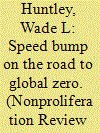

|
|
|
|
|
| Publication |
2013.
|
| Summary/Abstract |
The prospect of the United States continuing to reduce the size of its nuclear arsenal to "very low numbers" has raised questions in Japan and South Korea, where US extended deterrence guarantees are premised on the "nuclear umbrella." In both countries, however, concerns focus less on numerical arsenal size than on the sufficiency of specific nuclear and non-nuclear capabilities to meet evolving threats and on the degree of broader US commitment to these alliances. This article assesses developments in US-Japan and US-South Korea relationships in response to the Obama administration's nuclear disarmament policies, focusing on how the evolutionary course of those relationships may in turn condition prospects for sustaining this US nuclear policy direction. The analysis finds that the challenges of deterrence credibility and allied reassurance are difficult and long-term, but also that US nuclear arsenal size is secondary to broader political, strategic, and military factors in meeting these challenges. The evaluation concludes that strong alliance relationships and strategic stability in East Asia can be maintained while the size of the US nuclear arsenal continues to decline, but also that deterioration of these relationships could imperil core US nuclear policy and nonproliferation objectives.
|
|
|
|
|
|
|
|
|
|
|
|
|
|
|
|